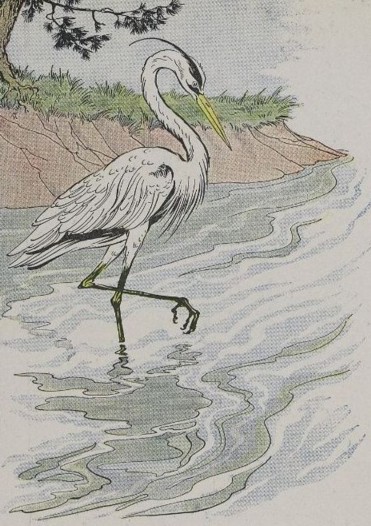PART A_1
Let’s learn vocabulary. Listen and repeat the words and the sentences with your tutor.
PART A_2
| 1. sedately | /se-DEYT-li/ |
| -in a quiet, relaxed, or slow way without excitement or risk | |
| Since it was still early for her class, she walked sedately to school. | |
| 2. scanty | /SKEN-ti/ |
| -smaller in size or amount than is considered necessary or is hoped for | |
| With the scanty amount of evidence, the accused was not convicted. | |
| 3. shallow | /SHA-low/ |
| -not deep | |
| The water in the river is shallow. | |
| 4. content | /kon-TENT/ |
| -pleased with your situation and not hoping for change or improvement | |
| She is content with the amount of love she is receiving from her family. | |
| 5. indeed | /in-DID/ |
| -really or certainly, often used to emphasize something | |
| Indeed, that was a great performance. |
PART B_1
Let’s read the story. Please read it aloud, and I will check your pronunciation and intonation.
PART B_2
The Heron

A Heron was walking sedately along the bank of a stream, his eyes on the clear water, and his long neck and pointed bill ready to snap up a likely morsel for his breakfast. The clear water swarmed with fish, but Master Heron was hard to please that morning.
“No small fry for me,” he said. “Such scanty fare is not fit for a Heron.”
Now a fine young Perch swam near.
“No indeed,” said the Heron. “I wouldn’t even trouble to open my beak for anything like that!”
As the sun rose, the fish left the shallow water near the shore and swam below into the cool depths toward the middle. The Heron saw no more fish, and very glad was he at last to breakfast on a tiny Snail.
Do not be too hard to suit or you may have to be content with the worst or with
nothing at all.
PART C_1
Let’s answer comprehension questions. Please answer them based on the story.
PART C_2
| 1. | What was the Heron doing that morning? |
| 2. | How did he react upon seeing a fine young Perch? |
| 3. | What did the Heron end up eating? |
PART D_1
Let’s discuss the story. Please answer the questions below and express your opinions.
PART D_2
| 1. | What could have been done by the Heron with the Perch? |
| 2. | What kind of trait was exhibited by the Heron? |
| 3. | Do you think he was really glad to settle with a snail? Why or why not? |
| 4. | Do you agree with the moral of the story? Why or why not? |
| 5. | Have you encountered a situation where this is applicable? |
REVIEW AND FEEDBACK
Now, let us review the things that you learned in this lesson.
ではこのレッスンで学んだことを振り返りましょう。
(Please give a short feedback on how your student did on your class.)
| Grammar 文法 |
Pronunciation 発音 | Vocabulary 単語 |
Comprehension 理解 |
|
|---|---|---|---|---|
 GOOD GOOD |
文法の誤りはほとんどなく、完全な文章で話すことができる | ほとんどの単語をはっきりと正しく発音することができる | 習った表現を適切に使うことができる | 文章を理解し、質問に正しく答えることができる |
 FAIR |
文法の誤りはあるが、完全な文章で話すことができる | 発音の練習が必要な言葉がいくつかある | たまにミスはあるが、習った表現を適切に使うことができる | 文章を完全に理解するのは難しく、質問に正しく答えられないときもある |
 POOR |
文章で話すのは難しく、単語だけで話すことができる | 発音の練習が必要である | 習った単語と表現を少しだけ使うことができる | 文章を理解するのは難しく、質問に答えるのは難しい |
Parts of this lesson material are based on:
An eBook from The Project Gutenberg.
This eBook is for the use of anyone anywhere at no cost and with almost no restrictions whatsoever. You may copy it, give it away or re-use it under the terms of the Project Gutenberg License included with this eBook or online at www.gutenberg.org
An eBook from The Project Gutenberg.
This eBook is for the use of anyone anywhere at no cost and with almost no restrictions whatsoever. You may copy it, give it away or re-use it under the terms of the Project Gutenberg License included with this eBook or online at www.gutenberg.org